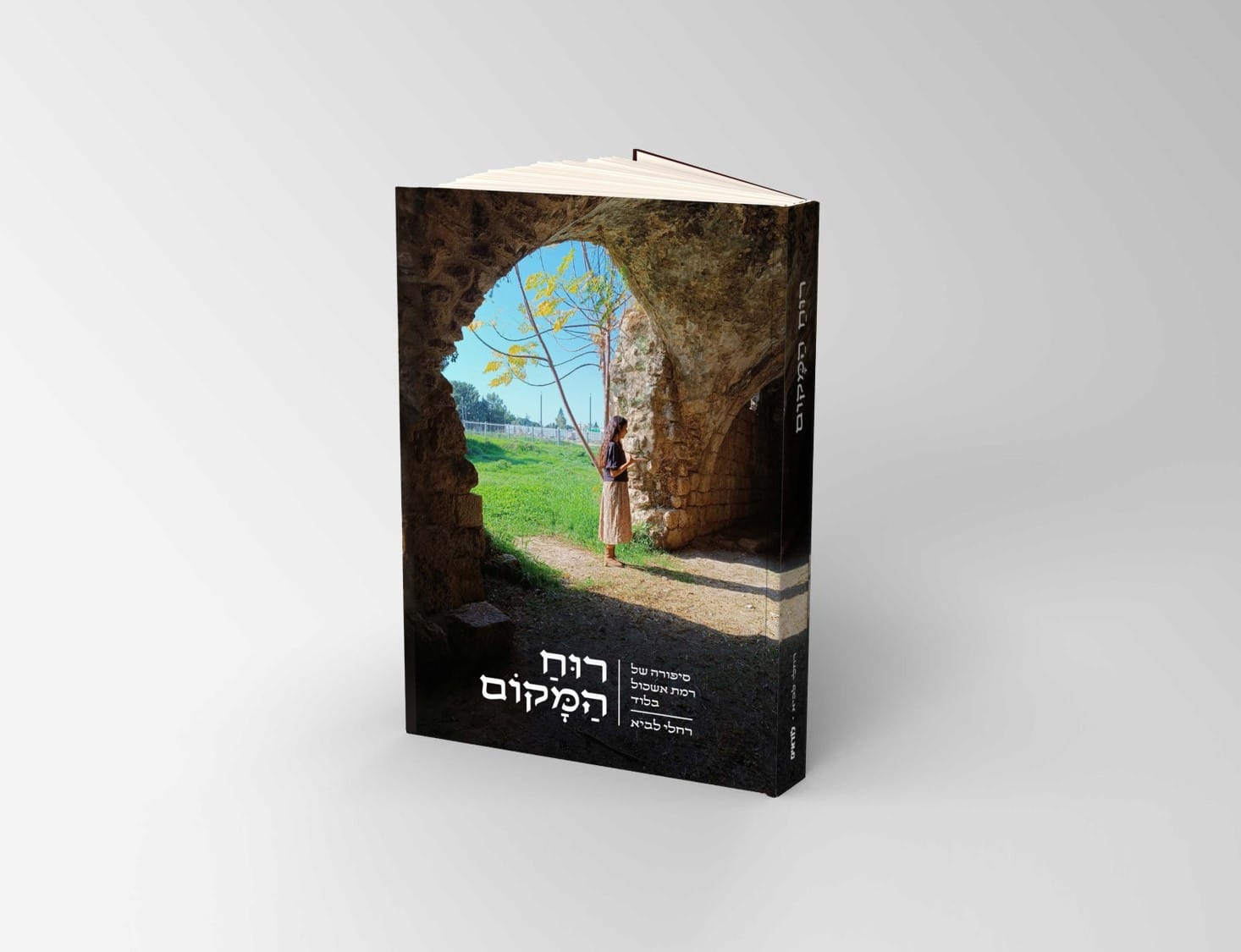"It Was Surreal: We Fled Under Guard While Our Arab Neighbors Laughed"
The Jewish residents of Ramat Eshkol in Lod cannot forget the horrific nightmare they experienced during the riots. They are now publishing a book to share their neighborhood's story. "It's not just our story, but the story of all of Israel."
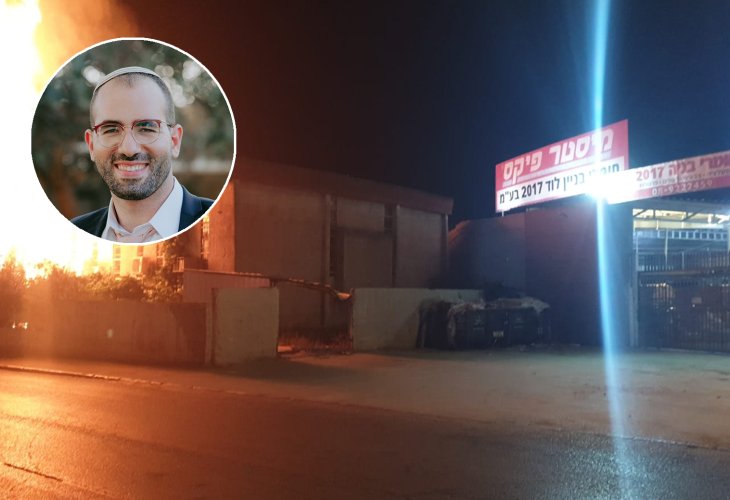 Arson at the Yeshuat Hashem synagogue on the first night of the riots, 5.10.2021 (Inset: Avichai Shukron)
Arson at the Yeshuat Hashem synagogue on the first night of the riots, 5.10.2021 (Inset: Avichai Shukron)When Avichai Shukron and his wife moved to the Ramat Eshkol neighborhood in Lod about eight years ago, they were part of a small community of a few Jewish families. At that time, around 70% of the neighborhood's residents were Arab, and most of the Jews living there were quite elderly. However, the young Jewish community that began forming was vibrant, establishing institutions, gardens, and parks, hoping to grow and flourish.
Nothing prepared them for the harsh riots that would occur six years later, nor for the unimaginable reality where their closest neighbors turned into enemies, setting fire to apartments and cars, and posing tangible threats to their lives.
"But our story is not a private one," Avichai clarifies, moments before recalling the horrors of those riot days. "It's not just the story of Ramat Eshkol's residents, but of all mixed cities in Israel and the entire Jewish people. We all need to understand the implications, as this is the only way to continue living in our country."
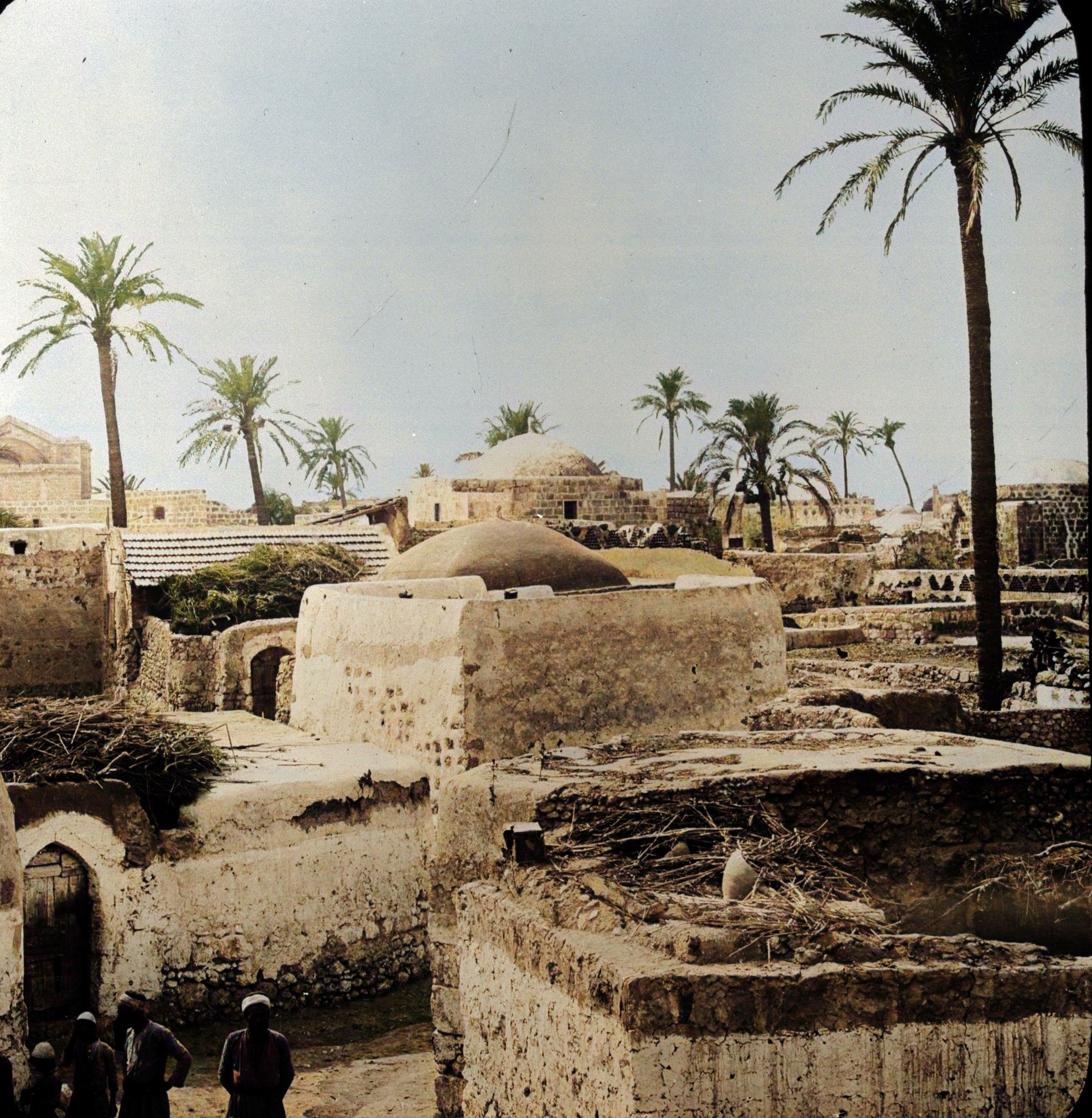 Ancient Lod, 1920 (Photo: Zev Vilnai Collection, from the KKL-JNF archive
Ancient Lod, 1920 (Photo: Zev Vilnai Collection, from the KKL-JNF archive
"We Were in Shock, Couldn’t Believe It Was Happening"
One of the first things Avichai notes is that people are not sufficiently aware of Lod's history. "This city was once considered the 'City of the Tannaim', as sources indicate that Rabbi Akiva and Rabbi Tarfon walked there. Archaeological excavations also prove that today’s Lod is the biblical Lod mentioned in the Bible and Talmud. This also has halachic implications, as a few decades ago, the rabbinate recognized that today’s Lod is the same Lod that was walled in Joshua's time, which is why Purim is celebrated on the 15th of Adar there in addition to the 14th."
When did modern settlement in Lod begin?
"In modern times, Jewish immigration to Lod started after the city was liberated during the War of Independence. That’s when the 'Ramat Eshkol' neighborhood was established, named after Levi Eshkol. Even the streets in the neighborhood are named after Zionist figures and terms, like 'Rabbi Kook Street', 'Exodus Street', 'Struma', 'Aliyah B'. It’s ironic that today, Arab residents live on streets with such Zionist names."
Avichai conducted extensive research on the subject, noting that until the 1980s, Ramat Eshkol was primarily inhabited by Jews, including new immigrants from various cities and ethnic groups. "The neighborhood was completely Jewish, a true symbol of success," he describes. "Some viewed it as Lod’s jewel, with synagogues packed to the brim, to the point where benches were placed in the streets for Shabbat services. Unfortunately, most synagogues are now inactive, and those that remain active see most attendance only on Shabbat, standing empty on weekdays."
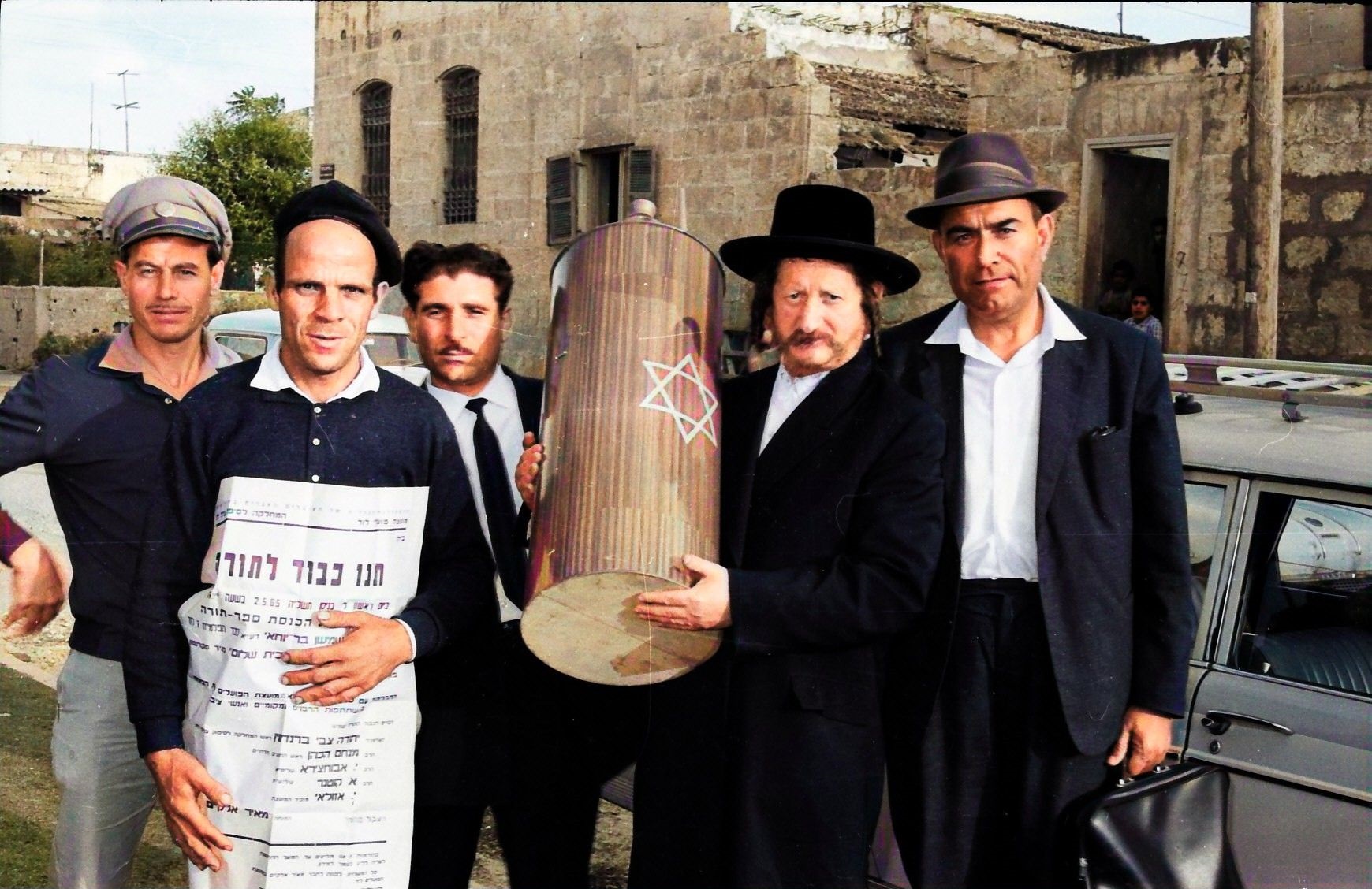 Sefer Torah brought to the Rashi Synagogue, attended by the city's rabbis - Rabbi Yitzchak Abuhatzeira (Baba Haki) and Rabbi Avraham Kutner, 2.5.1965 (Photo: Marcel Michael Almagor
Sefer Torah brought to the Rashi Synagogue, attended by the city's rabbis - Rabbi Yitzchak Abuhatzeira (Baba Haki) and Rabbi Avraham Kutner, 2.5.1965 (Photo: Marcel Michael AlmagorWhy did Jews leave the neighborhood?
"Jews began leaving when the Arab population moved in, most relocating to nearby neighborhoods or cities. About 30% remained, showing great dedication by insisting on staying. Some couldn't afford to move elsewhere, while others were adamant this was their home and saw no reason to leave. They faced difficult times, vandalism, and harassment, often living in fear, but always hoped for change.
"In 2010, the pre-military academy 'Ma'oz' was founded in Lod, bringing dozens of young men into the neighborhood on Shabbat for prayers at the synagogues, reinvigorating the Jewish atmosphere. Alongside the academy, three Jewish families considered 'crazy' at the time moved in, believing it their mission to repopulate Ramat Eshkol with Jews.
"Since then, the neighborhood has seen significant growth, with more families buying homes and settling. New minyanim were established in synagogues, and kindergartens, institutions for children, parks, and playgrounds were built. While Arabs still constitute a majority, the religious nucleus in Lod has grown."
Do you interact with your Arab neighbors?
"We live in the same buildings, fostering a sort of coexistence. But our decision to move here wasn’t due to the Arabs, but in spite of them. We felt a mission to revive the neighborhood's Jewish presence. Despite initial difficulties with neglected buildings and infrastructure issues, we decided to create change. We introduced ourselves to neighbors, formed a homeowners' association for maintenance. We often felt trust existed, and apart from politics, shared many common views until the riots changed everything.
Were you surprised by the riots during Operation Guardian of the Walls?
"Very surprised, it was a real shock for us, a sense of betrayal. These were neighbors, some of whom paid condo fees, who then participated in burning cars and homes. There was no doubt the unrest was led by local Arabs, not outsiders, as they targeted only Jewish properties.
"The peak for me was when Igal Yehoshua was murdered. Yehoshua, who everyone knew as a kind man, was ambushed in his car when he opened his window after being approached. Stones were hurled at him, and in his last moments, he called out naively, 'It's me, Igal.' He managed to drive home but collapsed and died. Another community member was stabbed, deeply traumatized despite physical recovery. We've all endured significant trauma and shocking, indelible memories."
Here to Stay
During the riots, did you stay or leave the city?
"Most of us fled, experiencing unimaginable fear while packing essentials, knowing we might lose everything left behind due to molotov cocktails and looting. We evacuated with backpacks under security, not meeting the eyes of neighbors who had chanted 'we redeem Palestine with blood and fire' the day before.
"In those days, both media and police failed us. Police couldn’t control the rioters, while media presented a misleading, 'balanced' view, giving a platform to justify the riots by the 'oppressed' Arab population, although they inflicted heavy damage, throwing stones and firebombs and burning properties."
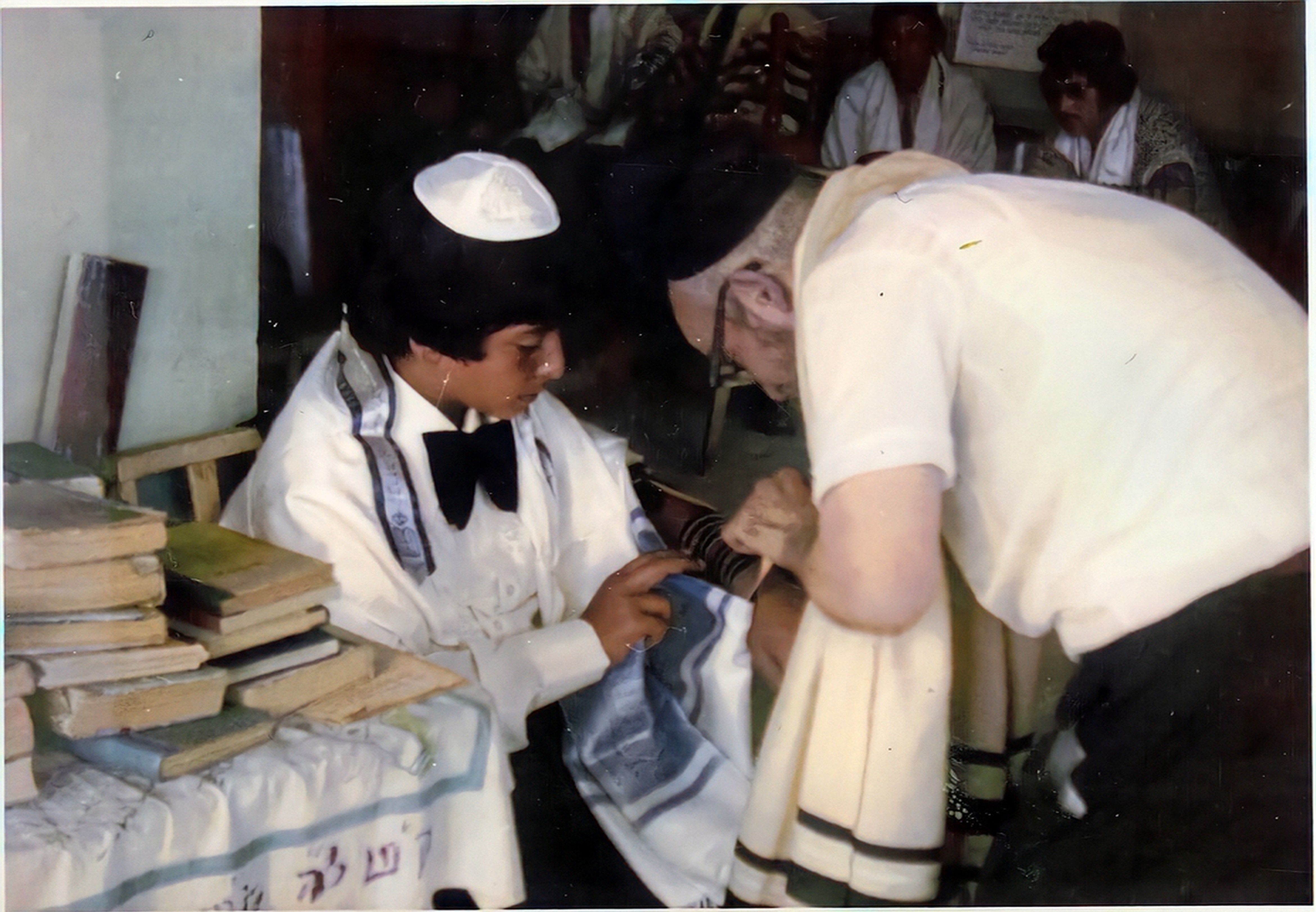 Shimon Trebalsi celebrates his bar mitzvah at Dosa Synagogue, Tammuz 5734 (1974). From a private album, courtesy of the family
Shimon Trebalsi celebrates his bar mitzvah at Dosa Synagogue, Tammuz 5734 (1974). From a private album, courtesy of the familyWhat is your current situation?
"Many of us returned, and conditions are better than before the riots. Our community now includes over 100 families, many of whom began as young couples wanting to live in central Israel, now envisioning raising their children here. The city feels safer, but trust with Arabs is non-existent. While cordial, they never call me by name, instead referring to me as 'the Jew'."
Do you think about the future?
"Of course, it's worrying, but our desire for meaningful living and settling the city outweighs the fear. This is why we’re determined to tell our story, as our very presence here is important.
"This is why we're publishing a book about Ramat Eshkol called 'Spirit of the Place'. Written by author Racheli Lavi, who interviewed over seventy Jewish residents, it’s a comprehensive narrative. We’re in the final stages of fundraising to publish it, aiming for broad readership to grasp Ramat Eshkol’s complex social, religious, historical, political, and national dimensions, proving it’s here to grow and remain."
